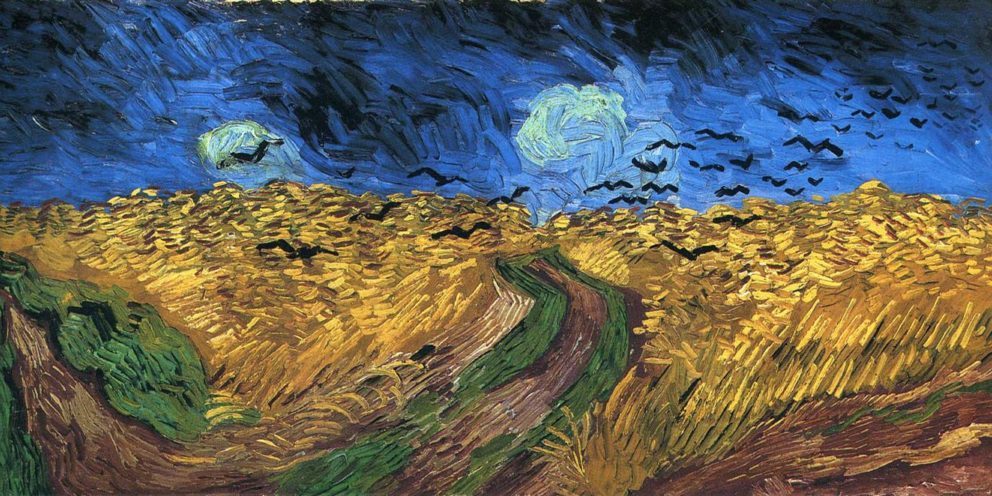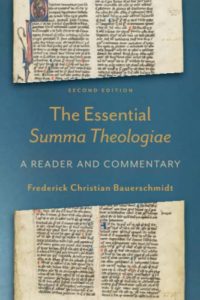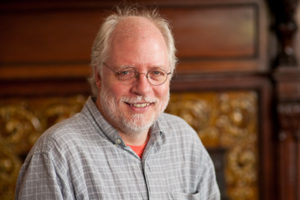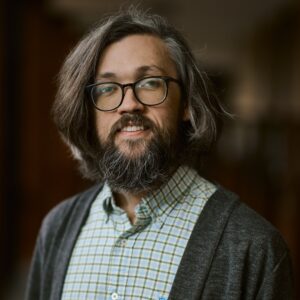
Meet Thomas Aquinas, a theologian for preachers
Self-proclaimed “Hillbilly Thomist” Frederick C. Bauerschmidt serves as professor of theology for Loyola University in Baltimore, Maryland. He was granted a PhD from Duke University after receiving his Master’s from Yale Divinity School. Bauerschmidt is an expert of medieval theology and has written works on the life and thought of Julian of Norwich and an introductory guide to the medieval mystics. Most recently he has published a second and expanded edition of his E ssential Summa Theologiae, a reader and commentary of Thomas Aquinas’s magnum opus. The book has been called the “ideal set of Summa selections for most classrooms” and “an indispensable learning tool for anyone who wants to come to grips with the thought of St. Thomas.” To write a commentary on the Summa Theologiae, a scholar must comprehend Thomas’s thought, but Bauerschmidt demonstrates an astute understanding of Thomas that surpasses many others who have attempted to explain the Angelic Doctor. Bauerschmidt understands Thomas as a theologian, a master of the sacred pages, a preacher, and as a man heavily indebted to Dominican spirituality and, as such, is able to help even the most hesitant beginners read Thomas fruitfully. He has graciously agreed to talk with Timothy Gatewood about the life and thought of Thomas, the legitimacy of a Protestant or Reformed Thomism, the role of Aristotle in Thomistic philosophy, and when readers should disagree with Thomas’s thoughts.
ssential Summa Theologiae, a reader and commentary of Thomas Aquinas’s magnum opus. The book has been called the “ideal set of Summa selections for most classrooms” and “an indispensable learning tool for anyone who wants to come to grips with the thought of St. Thomas.” To write a commentary on the Summa Theologiae, a scholar must comprehend Thomas’s thought, but Bauerschmidt demonstrates an astute understanding of Thomas that surpasses many others who have attempted to explain the Angelic Doctor. Bauerschmidt understands Thomas as a theologian, a master of the sacred pages, a preacher, and as a man heavily indebted to Dominican spirituality and, as such, is able to help even the most hesitant beginners read Thomas fruitfully. He has graciously agreed to talk with Timothy Gatewood about the life and thought of Thomas, the legitimacy of a Protestant or Reformed Thomism, the role of Aristotle in Thomistic philosophy, and when readers should disagree with Thomas’s thoughts.
1. How did you you first meet Thomas Aquinas?
My first exposure to Thomas was in an undergraduate class on Augustine, Aquinas, and Luther. I had written a fairly mediocre paper on Augustine for the class, and the professor challenged me to put a bit more “sweat” into my next paper. I took up the challenge and wrote a paper on God and final causality in Thomas that required me to rethink how I conceived God’s relation to the world and began to make me realize what it meant to really wrestle with a text (the professor deemed it “a very sweaty paper”). A few years later I took George Lindbeck’s seminar on Aquinas at Yale Divinity School, where I learned not simply what Thomas thought about this or that thing, but what I might call the “grammar” of his theology. I did further coursework on Thomas at Duke with Stanley Hauerwas and David Steinmetz.I see Thomas as a brilliant pedagogue. Having now spent over a quarter century as a teacher, I have found Thomas to be an inspiring example. Click To Tweet
But it was only once I found myself at Loyola University in the position of teaching a course on Thomas that I think I really began to appreciate his work. I see Thomas as a brilliant pedagogue, and it was only when I myself was trying to lead student through his arguments that I really grasped how illuminating were the questions he asked, the arguments he made, and the distinctions he drew. Having now spent over a quarter century as a teacher, I have found Thomas to be an inspiring example of how being a theologian is really a matter of figuring out how to help people discover a path into the mystery of God.
2. What is one Thomistic thought that you wish received further scholarly attention and widespread recognition?
Thomas describes the task of the Christian teacher as “handing on to others what has been contemplated.” He understands theology as directed toward contemplation of the mystery of God, a contemplation that is the culmination of our attempt to figure out all the things that God is not, that moment when the mind is stilled and the intellect touches upon the truth of God. Thomas is sometimes seen as an almost inhuman theological machine, into which one feeds the data of revelation, which then spits out theological conclusions. I think more attention to the contemplative element in his thought would show that Thomas’s thought is not a rigid, rationalistic system, but is really quite flexible and organic, and that there is a lot theologians could learn from him about how to integrate theology and prayer.Thomas’s theology is extremely rich in the sources it draws on, and while Aristotle is an important element in the mix, Thomas is not simply a Christian Aristotelian. Click To Tweet
3. You studied Thomas Aquinas at diverse institutions. Can Protestants retrieve Thomas Aquinas or is Aquinas the exclusive property of Rome?
My formal study of Thomas took place outside of Catholic institutions and was undertaken with non-Catholic teachers. So from the outset I have seen Thomas as an ecumenical figure, a resource for all Christians. Indeed, I think I benefitted from reading Thomas in an environment where he was simply one voice among many in the Christian tradition and did not bear the burden of authority that one often finds in a Catholic context. Too often Catholic theologians see Thomas as either an oracle that must be blindly obeyed, or as baggage that must be cast off in order to develop any theological creativity. Protestants can approach his thought appreciatively, but with a certain freedom.
At the same time, I do think that there are aspects of Thomas’s thought that Protestant readers can have a hard time appreciating. For example, what we often think of as Thomas’s “ethics” is really about training priests to hear confessions and assign appropriate penances, and if one is in a tradition where this is not practiced then it can all seem a lot more theoretical than Thomas intended it to be. Likewise, I think his Christology, his account of who Jesus is and what he did and suffered, really only finds its completion in Thomas’s sacramental theology, which is all about how Jesus continues to be active through the sacramental life of the Church. Those in traditions that give a less central role to the sacraments might not see this as clearly.
At the end of the day, however, I think it is less important to be able to identify oneself as a “thomist” than it is to engage with Thomas’s thought, to let him pose questions to you and to sift through his arguments. If a Protestant does that, then he or she is “thomist” enough for me.
4. Why should we not overlook the pastoral and spiritual side of Thomas’s life and teachings? Wasn’t Thomas just an academic who wrote for other academics?
Works of the past are just as much “other” to us as the writings produced by different cultures today, and I think that part of what it means to encounter the other is to try to grasp what motivates them. So I think it is important to ask what Thomas thought he was up to. And what he was up to was something not entirely different from what theologians today are up to—or at least should be up to. And that is, as the letter to the Ephesians puts it, trying to “equip the saints for the work of ministry, for building up the body of Christ.”
Of course, “the work of ministry” differs from time to time and place to place, but what is constant is seeking “the unity of the faith and of the knowledge of the Son of God,” not simply as an intellectual exercise, but as a means of attaining “the full stature of Christ,” which is the ultimate goal of the spiritual life. So I think it is this common task that unites what we do in our own time in place to what Thomas was doing in his time and place.
5. An event that occurred towards the end of Thomas’s life is surrounded in mystery. What do you think happened to Thomas on the feast of St. Nicholas in 1273?
Thomas was known for his prodigious capacity for work, so when, after celebrating Mass on the morning of December 6, he went back to his room rather than taking up the tasks of the day, this was noteworthy. His assistant, Reginald of Piperno, asked him whether he was ready to start work, but Thomas replied “I cannot.” And when pressed he said, “Everything I have written seems like straw by comparison with what I have seen and what has been revealed to me.” After this, he broke off working on his various projects and did not return to them before dying a few months later, most notably leaving the Summa theologiae incomplete.
So one question is “what happened that led Thomas to stop working?” Did Thomas have a mystical vision? A stroke? A nervous breakdown? It is hard to say, particularly at a distance. We do know that Thomas was still capable of intellectual work, since we have a couple of short written replies he gave after this to specific questions posed to him by correspondents. These show that he retained his mental acuity. But seemingly whatever the experience, it caused him to lose interest in writing.
Which leads to another question: “what did he mean in describing his writings as straw?” Did he mean, as some have claimed, to repudiate their value? I don’t think so. A constant theme in Thomas’s writings is the importance of speaking as accurately as possible in theology, while acknowledging the inadequacy of all our human concepts when we try to apply them to God. So in describing his writings as “straw,” he is not saying anything different than what he had said in those writings themselves. Perhaps, sensing that the end of his life was near, he felt called to devote himself to contemplation of God’s mysterious reality rather than the attempt to express that reality in paltry human words. Of course, straw is also excellent tinder that the merest spark can set blazing, so perhaps thinking of our theological efforts as straw that awaits the spark of the Spirit is not so bad after all.
This excerpt is from the latest issue of Credo Magazine. Read the rest of the article here!


